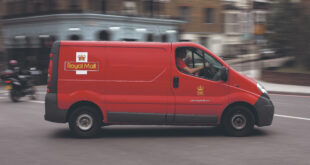The Royal Mail has put up stamp prices by 11% for first-class and 3% for second-class, blaming Brits sending fewer letters and its own rising costs for the rise
Image: PA)
The price of first- and second-class stamps has just gone up as Royal Mail price hikes come in today.
The cost of a first-class stamp has gone up by 10p to 95p, while second-class stamp prices have risen 2p, to 68p.
Royal Mail said prices had to go up as Brits are sending fewer letters, and because inflation is so high, increasing its own costs.
The postal service said if it didn’t put up prices then it could not continue its ‘universal service’.
This is the promise that it costs consumers the same price to send a letter to any address in the UK, six days a week.
The Royal Mail is also grappling with the fact Brits send fewer letters than they used to – meaning it makes less money.
We send 60% fewer letters than we did in 2004/5, and around 20% less than at the start of the pandemic in March 2020.
The Royal Mail has previously defended its price hike decision by saying Brits pay less for their stamps than almost anywhere else in Europe.
The postal service said the average cost of sending a first-class letter in Europe is £1.36.
However, the Royal Mail has u-turned on its plans to set a hard deadline for households to use up their old stamps.
Its original plan was to give Brits until January 31 next year to use up any existing Royal Mail stamps – including seasonal ones such as Christmas stamps.
The rising cost of stamps may seem small, but it comes at a time when households are facing huge increases in the cost of living.
Households are facing eye-watering rises on energy bills from last week as the maximum amount firms can charge people on default tariffs rose by an average of £693.
The average council tax bill went up by £67 last week, but the good news is there is help available to reduce them – and even cut costs down to zero.
Petrol and diesel prices are at near-record highs .
Average household water and sewerage bills in England and Wales are rising by around £7 a year (1.7%).
On April 6 a £12billion rise in National Insurance will hit working people as the Treasury looks to cut Covid backlogs in the NHS and begin funding social care.
Employees will pay 1.25p more in the pound on earnings above the threshold, a rise from 12% to 13.25%.
Chancellor Rishi Sunak has raised the threshold at which workers start paying National Insurance by £3,000 to £12,570 – claiming it’d save Brits up to £330 a year.
But this doesn’t factor in a 1.25 percentage point rise in the same tax (above). This will cut into the £330 saving, and outstrip it entirely for anyone earning over £37,000 a year.
Shadow Chancellor Rachel Reeves accused Rishi Sunak of “making an historic mistake” by failing to scrap a tax hike on jobs, warning families will “endure significant hardship”.
Officials are also confident that inflation is so high, there will still be more National Insurance coming in overall – despite thresholds being raised.
Read More
Read More



